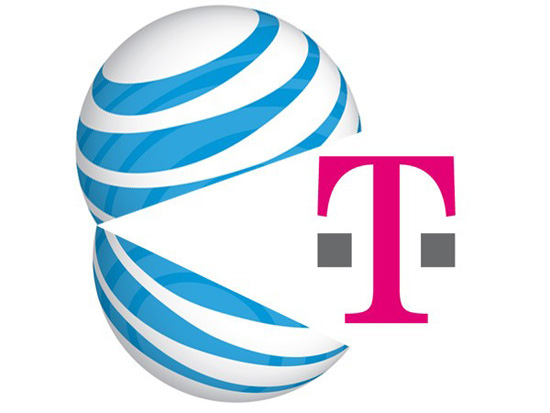
As if Millions of Calls Cried Out in Terror, and Were Suddenly Dropped1
Posted In Blog,Geek,Internuts
T-Mobile, the scrappy fourth largest US cellphone carrier owned by Deutsche Telekom, may soon go the way of Cingular (remember them?). AT&T has submitted a $39 billion bid to buy the company and is seeking approval from the FCC and other regulatory agencies. The deal to acquire T-Mobile’s 37.3 million subscribers would catapult AT&T from its current #2 market-share position (behind Verizon) to #1, and leave the US with only three major national carriers. As a result, regulatory approval of the merger is not a foregone conclusion.

“Consumers have borne the brunt of the increasingly concentrated market for mobile phone service,” said Senator Herb Kohl, a Democrat from Wisconsin who chairs the Antitrust, Competition Policy and Consumer Rights Subcommittee.
“The explosion of cellphone usage – especially smartphones – makes competition in this market more important than ever as a check on prices, consumer choice, and service,” Kohl said.
“That’s why the Antitrust Subcommittee will take a close look at what this loss of competition will mean for people who increasingly rely on wireless phone service to connect to friends, family and the Internet.”
Senator Jay Rockefeller, a Democrat from West Virginia who chairs the Senate Commerce Committee, said, “It is absolutely essential that both the Department of Justice and the FCC leave no stone unturned in determining what the impact of this combination is on the American people.”
Being the cynical person that I am, I suspect AT&T will somehow manage to grease enough palms to get this deal through. So what does this mean for T-Mobile subscribers? Well, I’ve got good news and bad news.
Foremost among the bad news: your T-Mobile smartphones might become slower and more expensive. T-Mobile’s #4 position allowed them to aggressively price their data plans. AT&T has long been one of the most expensive carriers, and plans to use T-Mobile’s 3G spectrum for its new LTE phones, so…
AT&T execs are saying that T-Mobile customers will have to replace their current 3G/4G phones once the merger is completed. This will be a mandatory upgrade unless of course you want your phone to work on edge only.
The spectrum they use for third-generation services, or 3G, will be re-purposed for 4G, which is faster. That would leave current T-Mobile phones without 3G. They would need to be replaced with phones that use AT&T’s 3G frequencies.
While one benefit of the merger may be that (former) T-Mobile subscribers gain access to AT&T’s iPhone units, Android (the Google-developed smartphone O.S. first marketed in the US on T-Mobile) users might feel the sting since AT&T’s Android implementation can be described as neutered at best.
Big Blue has routinely locked down the nominally open-source Android, and has refused to allow its users to install non-market applications. The company also has a history of failing to pass along updates to its users in a timely manner. In fact, it’s been reported that none of AT&T’s Android phones received a single update from June to December of 2010.
Furthermore wi-fi tethering, a key feature built in to the latest versions of Android, costs an extra $45 a month on AT&T. And if you try to circumvent this restriction, AT&T will find your ass. T-Mobile meanwhile, only recently began asking for an extra $15 a month for the feature, and as someone who’s never paid that fee – and has used the feature several times – they never seemed to crack down on the practice.
Delving further into the downside, as early adopters of the iPhone can tell you, AT&T’s service leaves about as much to be desired as a photograph of plastic food. The company routinely lands at the bottom of the list of cell-phone carriers in every category, from voice quality to customer support.
So what’s the good news? Well, AT&T will almost certainly make changes to the terms of service for existing T-Mobile subscriber’s contracts, and that’s one of the few ways to get out of your contract for free. Your contract cannot be changed in any “materially adverse” way without your permission. If AT&T tries to make your T-Mobile data plan half as good and twice as expensive, I’d call that pretty adverse.
But if you are looking to make a move – I hope you like the other two choices.
Image courtesy of TmoNews.

